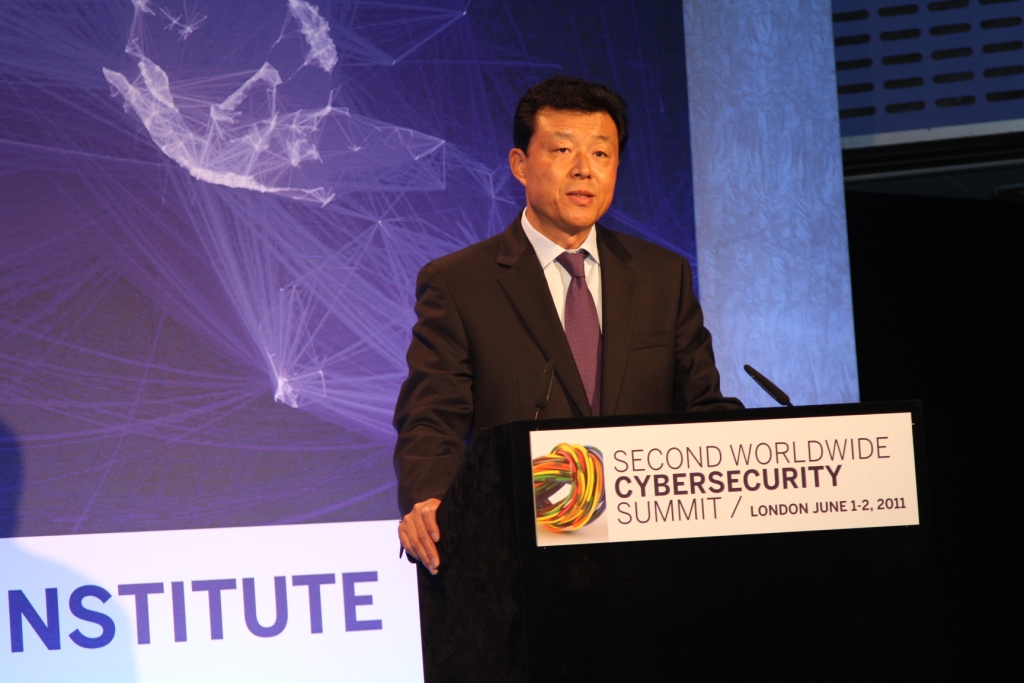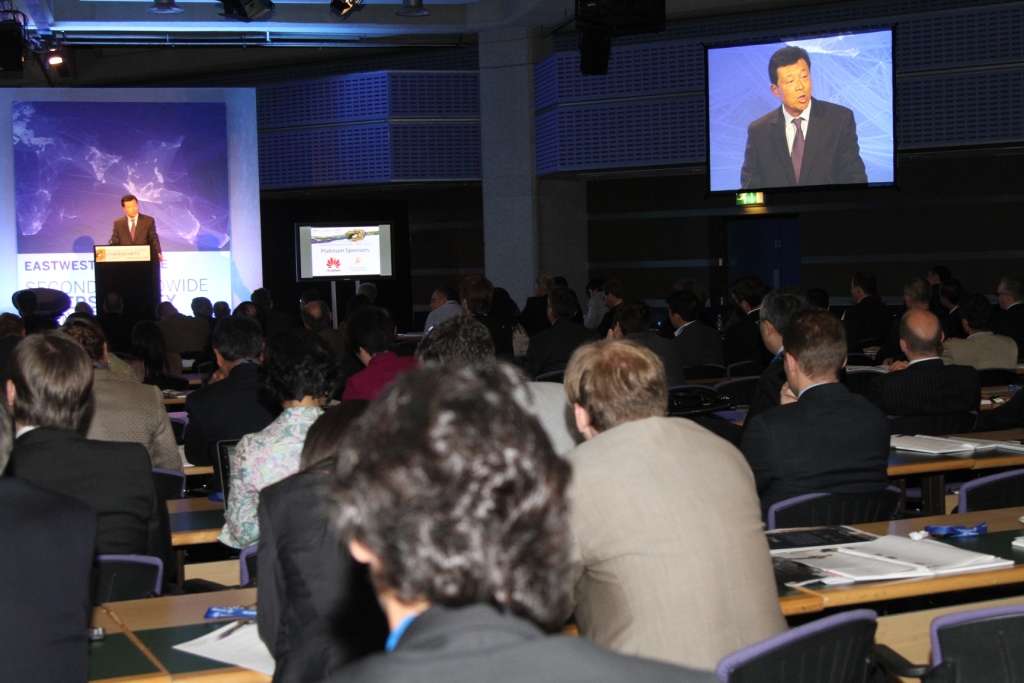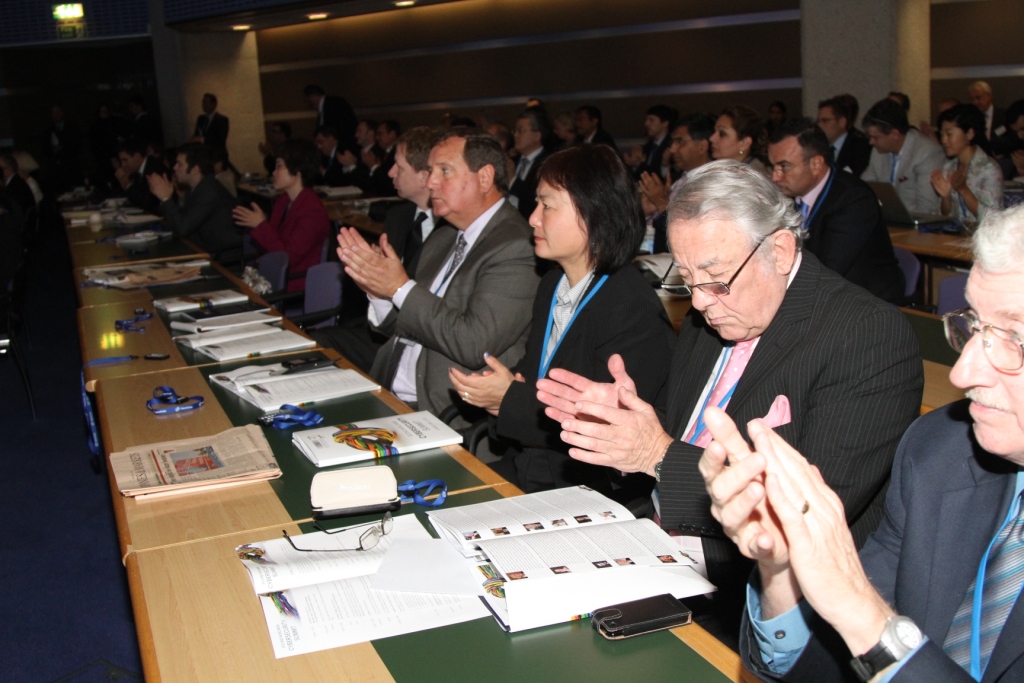|
(1st June 2011, Queen Elizabeth II Conference Centre, London)

Mr Chairman,
Ladies and Gentlemen,
It is a real pleasure to join you at the Second Worldwide Cybersecurity Summit. I would like to thank and congratulate the EastWest Institute on being such a gracious host of the Summit.
Today many countries celebrate International Children's Day. Let me first of all extend my best wishes to your children and children around the world. This provokes the thought of what kind of legacy our children will inherit in cyberspace. Today many parents have deep concern about the impact of cyberspace on their children. There is much harmful information on the Internet, such as pornography, violence or even terrorist preachings.
Yesterday in London we saw a valuable step to creating a cyberspace that is safe for our children. I was delighted to learn how the EastWest Institute hosted the International Youth Congress on Digital Citizenship. I understand the Congress discussed ways to protect and empower children and teenagers in our digital world. This is a testimony to greater awareness for international cooperation against this common challenge.
This leads us to the wider issue of cybersecurity.
The Internet is one of the greatest inventions in the 20th century.
I believe that our children will look back and judge its impact as a great revolution in human progress. The Internet is a revolution in communications that is even more far-reaching than the railways, planes, cars and telephones that utterly transformed our world in the 20th century.
The 21st century is now often called the 'Digital Age', or the 'Century of the Internet'.
These descriptions precisely reflect the profound changes the Internet has made world-wide. The Internet now impacts on every aspect of the political, economic and cultural life of mankind.
The consequence of this influence on all our lives means security of the Internet becomes a major issue. It is especially a concern for the personal safety of our children.
Today we are gathered here for in-depth discussions on cybersecurity. It is an important step by the international community to advance cooperation in the field.
My contribution is to share with you the perspective from China. I will describe the current state of Internet development in China and the measures taken by the Chinese government to strengthen international cooperation on cybersecurity. My points will cover four aspects.

First, China has come a long way in Internet development.
China was connected to the World Wide Web for the first time in 1994. Since then the Internet has evolved as a major opportunity to push forward the reform and opening-up and modernisation of China.
The Internet in China has greatly facilitated information exchange and sharing. Cyberspace has enhanced productivity and people's living standard and promoted economic and social progress.
China now has 457 million Internet users. This is a number larger than any other country in the world.
The Internet penetration rate is 34.3% of the population.
E-Commerce is developing fast, with the number of online shoppers increasing by almost 50% year-on-year.
Online payment and banking are widely used and more and more economic transactions are done online.
Chinese Internet users are very active. Currently there are 230 million bloggers, 120 million microbloggers and over one million Bulletin Board Systems.
Some Chinese Internet companies have gone public on the international market. This is an indication that the international community is excited about investing in the Chinese Internet industry.
My second point is that China upholds cybersecurity in accordance with law.
Cybersecurity is increasingly a major challenge to the Chinese government.
China has seen an increase in the number of cyber-crimes in recent years. Cyberspace is being used as a new tool for conventional criminality.
There is a fast growth of property infringements through cyber-fraud and theft.
Crimes of making and spreading viruses, hacking into and attacking computer systems and communication networks are on the rise.
Statistics from the Chinese public security authorities show that the number of cyber-crimes had gone up by 340 times from 1998 to 2009.
About 60% of the ministerial level websites in China faced security threats of varying degrees in 2010.
Phishing directed against major E-business, financial institutes and third-party online payment is increasing.
Trojan horses and zombie viruses are still posing immediate threats to China's cybersecurity.
Since 1994, China has enacted a series of laws and regulations related to cybersecurity. The laws are:
-
Regulations on Telecommunications.
-
Regulations on the Protection of Computer Information System Security.
-
And Measures on Protection of Computer Information Networks Connected to the Internet.
There are provisions about the Internet in other Chinese regulations:
It is fair to say the Chinese government has taken effective measures to ensure cybersecurity.
The number of Chinese websites tampered by hackers was down by 21.5% between 2009 and 2010.
The number of email spam originated in China is on a steady decrease.
The third point I wish to convey is international co-operation. The Chinese government has always supported international cooperation in cybersecurity.
We are now in an era where the whole world is linked by the Internet. That means cybersecurity is a vital global issue that calls for international cooperation.
No single country can deal with cross-border issues such as hacking, viruses or spam on its own.
China is facing serious overseas cybersecurity threats. These are monitored by the China National Computer Emergency Response Team (CNCERT).
Their 2010 report shows that out of the nearly 480 thousand Trojan server IPs found, 221 thousand were outside China.
Out of the 13,782 Zombie server IPs found, 6,531 were outside China.
This means that almost half of the above cybersecurity threats come from outside of China.
The CNCERT 2010 report shows that over half of the malicious domain names with illegal actions, such as planting Trojan and phishing, were registered outside of China.
The CNCERT report also shows that China is a victim of international cyberspace crimes.
It is therefore not factual to claim that hackers originate from China, nor is it conducive to international cooperation in cybersecurity.
China stands for extensive international cooperation and exchanges in cybersecurity at multiple levels.
China welcomes the establishment of bilateral or multilateral mechanisms for dialogues and exchanges on cybersecurity to settle differences through fair and balanced consultations.
China backs international exchanges among industrial associations. It encourages them to increase common understanding through such discussions to meet the challenges facing the industry.
China encourages experts and scholars from different countries to engage in academic exchanges and share their findings.
China advocates strengthened collaboration among law enforcement authorities of different countries.
China believes the way forward is to jointly deter and fight cyber-crimes through a multilateral cooperation mechanism.

The fourth and final point is about China's role in international cooperation. The Chinese government has been an active player in international cooperation in cybersecurity.
China took an active part in the successive World Summits on the Information Society. China has participated in other major international or regional conferences related to the Internet.
This includes the First Worldwide Cybersecurity Summit hosted by the EastWest Institute in Dallas.
China is committed to regional cybersecurity cooperation. In 2009 China signed an agreement with ASEAN and members of the Shanghai Cooperation Organization. They were called:
The China-ASEAN Coordination Framework for Network and Information Security Emergency Responses and the Agreement among the Governments of the SCO Member States on Cooperation in the Field of Ensuring International Information Security.
In addition the Chinese public security authorities have joined with the following:
China has had bilateral or multilateral consultations with their counterparts in the United States, the UK, Germany, Italy and Hong Kong to discuss ways to combat cyber-crimes.
Since 2006 the public security authorities of China have handled more than 500 requests of assistance for cyber-crime investigation from over 40 countries and regions.
Three sessions of the China-UK Internet Roundtable and four sessions of the China-US Internet Industry Forum have been convened to discuss cybersecurity.
This Summit will see the publication of an important report. It is the product of a collaboration between The Information Office of the Chinese State Council and the EastWest Institute. The report is called – Fighting Spam to Build Trust.
I would like to draw your attention to the first paragraph of the Executive Summary. It describes a key agreement reached when President Hu Jintao met with President Barack Obama during a State visit to the USA in January this year. It reads:
Early in 2011, U.S. President Barack Obama and President Hu Jintao of the People's Republic of China committed to improving the U.S.-China bilateral relationship. In a joint statement, they specifically agreed to "advance cooperation to … address cybersecurity."
This report Fighting Spam to Build Trust represents the first effort by Chinese and U.S. experts to work together on a major cyberspace challenge.
Such constructive bilateral efforts has set a strong example and laid a solid foundation for wider cooperation in the field.
Ladies and Gentlemen,
This Summit has brought together political leaders, industrial associations and experts in the field.
I am confident that with your insight and vision, the Summit will inspire and facilitate international cooperation in cybersecurity and help countries share experience.
I believe that with your tireless efforts and continued international cooperation, the Internet will no longer be a lawless 'fifth space'.
By working together, we can make the Internet a cleaner and more healthy place. On this International Children's Day I hope that together we have taken steps towards that goal.
We must create a legacy for our children in cyberspace that will create positive advances for the whole of humanity. That kind of legacy can make a great contribution to creating a prosperous, sustainable, harmonious and peaceful world.
Thank you.

※ ※ ※
On 1-2 June, the famous US think tank EastWest Institute held the second Worldwide Cybersecurity Summit in London. Over 300 people from over 40 countries, including the UK, the United States and India, were present. Among them were government officials, leaders of the Internet businesses, scholars and experts in the field. The Summit focused on how to strengthen cooperation on cybersecurity. Ambassador Liu Xiaoming attended the event and delivered the above keynote speech.
Founded in 1980 and headquartered in New York, the EastWest Institute is a non-profit, non-partisan think tank. It focuses on issues such as cybersecurity, preventive diplomacy, US-Russia relations, US-China relations, global and regional security. Apart from New York, it has offices in Brussels and Moscow. It hosted the first Worldwide Cybersecurity Summit in Dallas in 2010.
|

